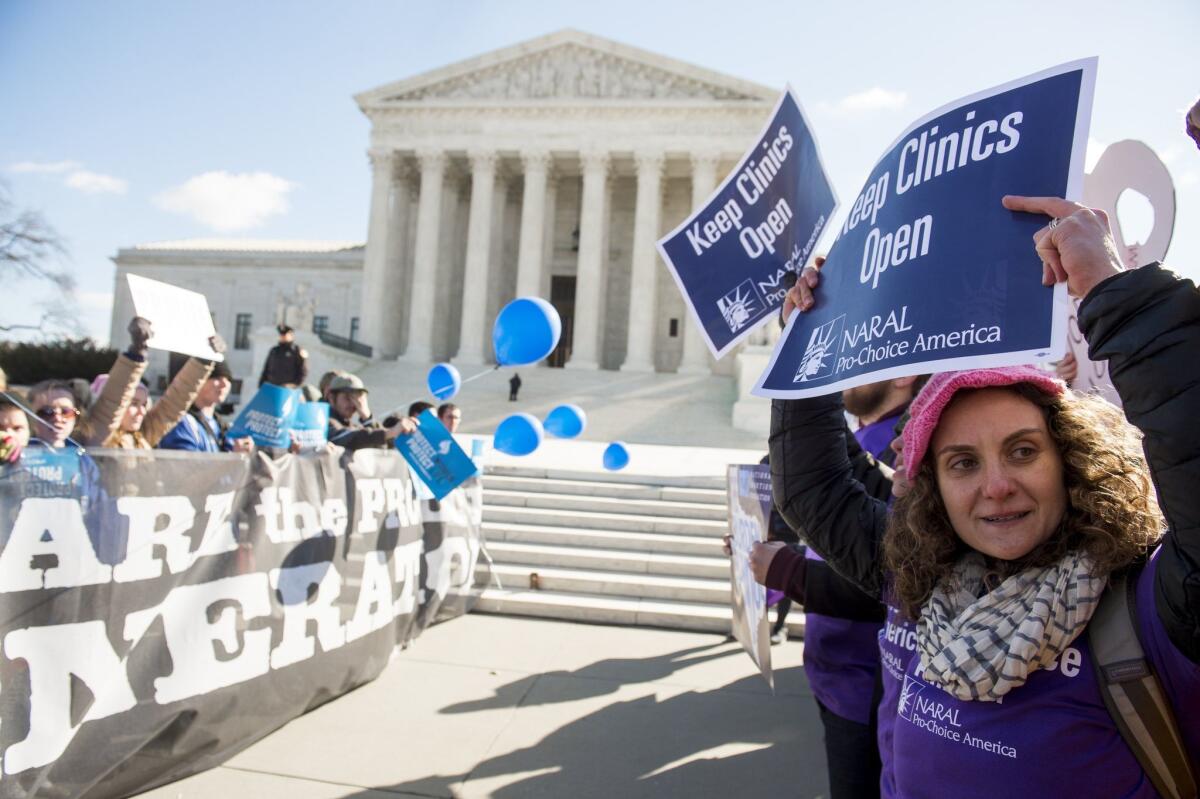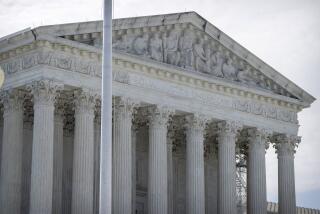Supreme Court asked to block Texas abortion ban

- Share via
WASHINGTON — Abortion providers in Texas asked the Supreme Court on Saturday to lift a state order that banned nearly all abortions in the state during the coronavirus pandemic.
The court’s decision could prove a pivotal test case for the openness of the bench, newly reshaped with two of President Trump’s appointees, to eroding abortion rights. If they decide to weigh in, the justices will determine whether the access to abortion outlined as a constitutional right in the Roe v. Wade decision can be suspended during a public health emergency.
“It is vital that the Supreme Court step in and protect the health, lives and futures of Texas women,” said Nancy Northup, president of the Center for Reproductive Rights, which filed the request for an emergency order alongside Planned Parenthood and other abortion providers in the state. “Texas is blatantly abusing its emergency power to obliterate Roe v. Wade.”
Texas Gov. Greg Abbott issued an order last month that banned nonessential healthcare procedures during the coronavirus pandemic. Like a handful of other Republican-led states, Texas included in that order all abortions except those necessary to preserve the life or health of the woman.
Judges have blocked similar provisions in several other states, including Indiana, Mississippi, Ohio and Oklahoma. But the Texas order has ping-ponged in the courts, resulting in the cancellation of hundreds of abortion provider appointments in the state.
Get our L.A. Times Politics newsletter
The latest news, analysis and insights from our politics team.
You may occasionally receive promotional content from the Los Angeles Times.
A federal judge initially blocked the Texas order, a decision that was reversed by the 5th Circuit. On Friday, another federal judge blocked portions of the order, which was again reversed. As of now, the only patients who can legally access abortion in Texas are those who would otherwise surpass the state’s legal gestational limit, which is 20 weeks.
The petition filed Saturday is the second major test for the Supreme Court during the coronavirus pandemic. Last week, the justices granted a request from Republican lawyers to block a judge’s order that would have given Wisconsin voters an extra week to submit their ballots by mail in the state’s primary.
Texas is relying on a 1905 ruling in which the Supreme Court said states can require people to get vaccinated during a smallpox epidemic or face fines or jail time. In this case, Texas argued that it has a similar interest in protecting the public health by preserving limited hospital space and medical equipment as the coronavirus spreads. The order prohibiting health procedures merely delays access to abortion, the state argued, and does not prohibit it.
Judge Kyle Duncan, who was appointed by Trump, wrote for the 5th Circuit that individual rights are not eliminated during a public health crisis, but the state is allowed to enact restrictions.
“When faced with a society-threatening epidemic, a state may implement emergency measures that curtail constitutional rights so long as the measures have at least some ‘real or substantial relation’ to the public health crisis and are not ‘beyond all question, a plain, palpable invasion of rights secured by the fundamental law,’” Duncan wrote in his opinion, which was joined by Jennifer Walker Elrod, who was appointed by President George W. Bush.
But the abortion providers say abortion is not only a constitutionally protected right but also essential healthcare that cannot be delayed. They argue that Abbott’s order could be in place for as long as the pandemic lasts and potentially much longer than the 40 weeks of a pregnancy.
The providers say a long history of legislation to restrict access to abortion in Texas reveals the true intent of the state’s most recent order.
“This tactic of using bogus health and safety justifications to close clinics is nothing new,” Northup said.
The American College of Obstetricians and Gynecologists warns against abortion bans during the pandemic. Abortion is “a time-sensitive service for which a delay of several weeks, or in some cases days, may increase the risks or potentially make it completely inaccessible,” the group said. “The consequences of being unable to obtain an abortion profoundly impact a person’s life, health, and well-being.”
Most abortions have been prohibited in Texas since March 23, when Atty. Gen. Ken Paxton explicitly said Abbott’s order includes most abortions. The order carries with it substantial penalties for healthcare providers: 180 days in jail or a $1,000 fine.
More to Read
Get the L.A. Times Politics newsletter
Deeply reported insights into legislation, politics and policy from Sacramento, Washington and beyond. In your inbox three times per week.
You may occasionally receive promotional content from the Los Angeles Times.











